Ever Googled a business or public figure and noticed a box on the right side of the search results with key details — like a mini profile? That’s a Knowledge Panel. It pulls in verified information from trusted sources to give users a quick snapshot of the entity.
But Knowledge Panels are more than just info boxes. When your brand appears in one, it’s like getting a Google-backed credibility badge. It tells users, “Hey, this brand is legit — here’s proof from multiple reliable sources.” People can instantly see verifiable details like your website, social profiles, and even mentions in reputable publications.
They also strengthen your E-E-A-T (Experience, Expertise, Authoritativeness, and Trustworthiness). When Google can reference data from authoritative sources like Wikipedia, Google Business Profile, and trusted databases to create a knowledge panel for your brand, it’s a sign that you have credible information and decent brand authority.
In short: triggering a Knowledge Panel gives your brand extra weight and authority — both with search engines and potential customers. Let’s dive into how they boost trust and how you can optimize it to earn one.
What is Google Knowledge Panel for SEO?
A Google Knowledge Panel is an information box on the right side of Google search results on desktop (or at the top on mobile). It appears when you search for well-known entities such as businesses, people, organizations, or landmarks.

Knowledge Panels provide quick snapshots of key details about an entity. Depending on the search query, they can display:
- A brief description or summary
- Business name, logo, and website
- Founder(s) and key people
- Description from Wikipedia or other sources
- Social media profiles
- Contact details and location (for businesses)
- Notable works (for authors, artists, or musicians)
- Related searches and categories
- Key facts and figures (e.g., birthdate, location, founder)
- Images, and more.
For example, when you search “Lebron James,“ you’ll see a Knowledge Panel that summarizes his name, date of birth, current team, net worth, etc.
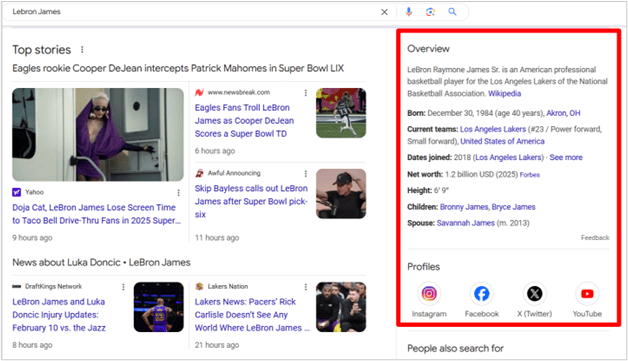
Where Does Google Get its Knowledge Panel Data?
Google gets its knowledge panel data from Knowledge Graph.
Google’s Knowledge Graph is a database of information about people, businesses, places, and things from trusted sources.
These sources include Wikipedia, Google Business Profiles (GBP), governmental and non-governmental databases, news outlets, and social media. Businesses and people featured in Knowledge Panels can even suggest updates to their information after claiming their panel.
Now, how does Google vet all this information? They’ve got a few systems in place.
First, there’s a public reporting system to prevent information that violates their overall content policies.
Also, Google manually removes policy-violating information.
Although Knowledge Panels and the Knowledge Graph are related, they’re not the same. The Knowledge Graph is the underlying database, and the Knowledge Panels are the visual representation of that data.
Here’s a closer look at their differences:
| Feature | Google Knowledge Panel | Google Knowledge Graph |
| Definition | An information box in Google Search results summarizes key facts about an entity (person, business, brand, organization, etc.). | A database Google uses to understand relationships between entities and facts, helping to generate Knowledge Panels and improve search relevance. |
| Visibility | Shown publicly on Google SERPs when searching for a well-known entity. | Works behind the scenes as Google’s internal knowledge database. |
| Data sources | Pulls data from the Knowledge Graph | Aggregates data from various sources, including Wikipedia, Wikidata, official databases, and trusted websites. |
| Who can get one? | Only entities that Google deems notable (businesses, public figures, brands, etc.). | No one. It’s Google’s property. |
| Customization | Can be claimed and edited by verified owners (e.g., via Google’s “Claim this knowledge panel” option). | Cannot be directly edited; Google updates it based on trusted data sources. |
| Impact on SEO | Increases brand authority and search visibility | Helps Google understand relationships between topics, indirectly impacting search rankings. |
It is also important to note that Google Knowledge Panels can display business-related information about your company, but they differ from Google Business Profiles.
While both appear in search results and provide crucial business information, they serve very different purposes.
Here’s how they differ:
Knowledge Panels vs. Google Business Profiles: Key Differences
| Feature | Knowledge Panel | Google Business Profile (GBP) |
| Who Gets It? | Well-known entities, brands, public figures | Local businesses with a verified listing |
| How It is Created | Automatically generated by Google | Manually created and managed by business owners |
| Where It Appears | Google Search (right side of desktop, top on mobile) | On Google Local Pack and Maps |
| Can You Edit It? | Can be claimed but not fully controlled | Fully controlled by the business owner |
| Source of Information | Knowledge Graph | Business owner, customer reviews, location data |
| Helps with? | Brand authority & credibility | Local SEO & customer engagement |
| Includes Reviews? | No | Yes (Google Reviews) |
| Links to Website? | Sometimes | Always |
What are the Types of Knowledge Panels?
Knowledge Panels display differently depending on what you’re looking for. Some are business-oriented, others highlight famous people and provide historical information and industry insight.
1. Local Business Knowledge Panels
A local business Knowledge Panel appears when users search for a specific business or a category of businesses within a location. Google’s algorithm sources its information from Google Business Profile (GBP) and other relevant sources.
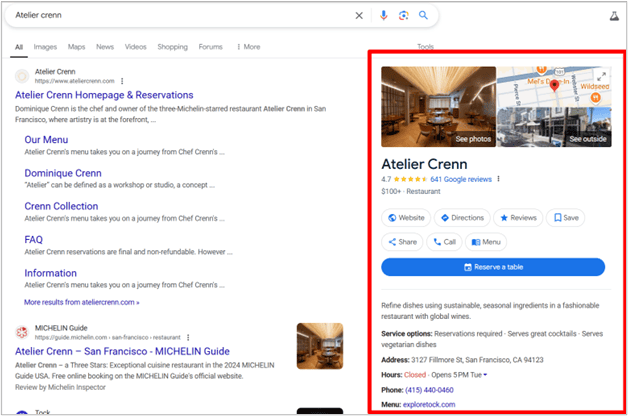
Bing also has a local business knowledge panel sourcing its information from Bing Places for Business and other trusted sources.
A local Knowledge Panel helps build real estate on brand SERP and receives a share of the SERP click-through rate (CTR). According to a recent report, it amounts to a CTR of 1.4 percent.
A Knowledge Panel also influences potential customers’ perception of your business and decision-making process.
However, search engine users’ geo-location affects the visibility of local Knowledge Panels. Google algorithms display information relevant to users based on their locations. That’s why you should consistently update your GBP with location-based information.
Also, use keyword.com, a local rank tracker, to monitor your brand SERP in different regions and see how to gain control of your Knowledge Panels in SERPs.
Further reading: How to Do White-Label Local SEO for Business Growth
2. Brand Knowledge Panels
Brand knowledge panels are common for large companies and corporations. It features the brand’s name, logo, company description, founder, website, social links, and more.
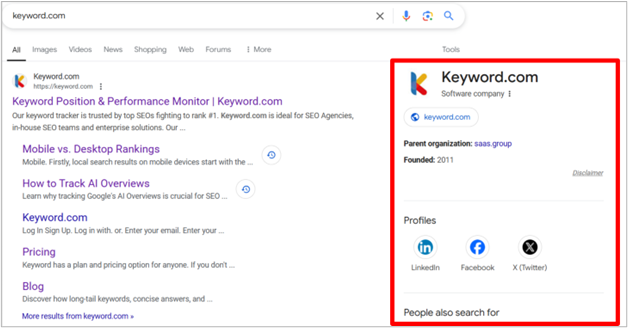
They provide direct answers about a brand. Like the local Knowledge Panels, users looking for contact details, social profiles, or official websites can access them instantly, leading to higher CTR on branded queries.
Google also pulls structured data from Knowledge Panels for voice search results. If your brand has one, it increases the chances of appearing in voice search responses, especially for direct brand-related queries.
3. People Knowledge Panels
You’ve probably Googled your name once (or ten times), hoping Google magically crowns you with one knowledge panel.
Unless you build a strong online authority, the algorithm isn’t giving you a VIP pass yet. We’ll show you how Google determines who gets a knowledge panel soon.
Google search results display People Knowledge Panels for notable figures and celebrities. These Knowledge Panels feature details about the person, including their background, career, and landmark achievements.
Drake Graham’s Knowledge Panel is a good example.
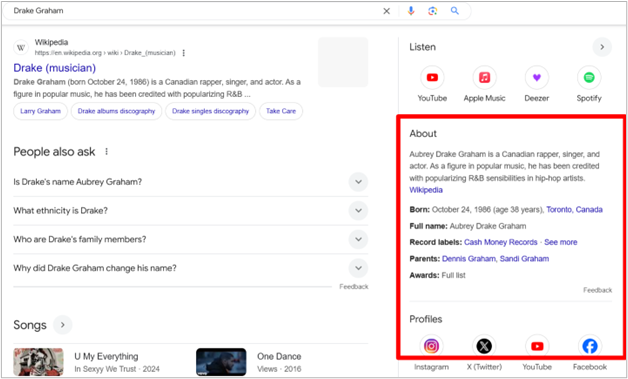
This knowledge Panel signals credibility and establishes a strong online presence.
4. Book and Movie Knowledge Panels
As the name implies, these Knowledge Panels are information boxes that appear in search results when users search for a specific book or movie.

5. Medical and Health Knowledge Panels
Medical & Health Knowledge Panels provide quick, trustworthy, and authoritative health-related information, helping users get reliable answers without clicking on multiple sources.
They sometimes include the medical conditions, symptoms, treatments, and medications.
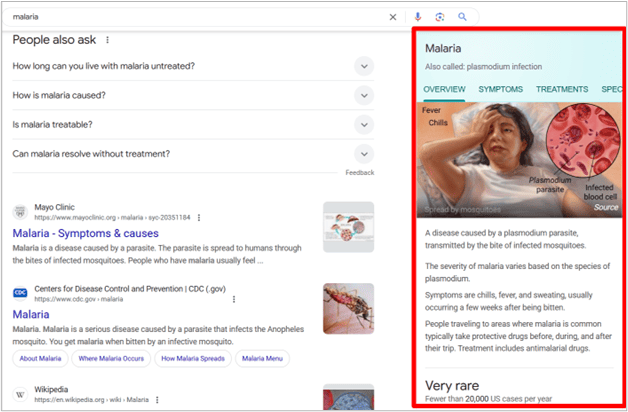
Google collaborates with medical experts, healthcare institutions, and government health agencies to ensure the accuracy of this information.
6. Sports and Event Knowledge Panels
Sports and Event Knowledge Panels provide quick, structured details about sports teams, athletes, live matches, tournaments, and upcoming or ongoing events.
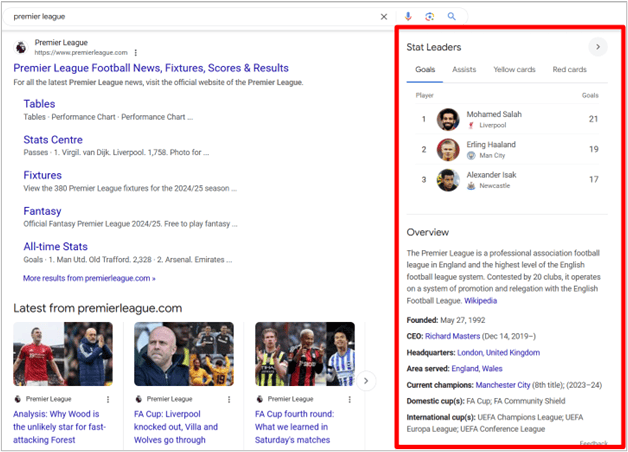
Now we’ve discussed the different types of Knowledge Panels, let’s examine how to optimize for them.
Best Practices for Optimizing Knowledge Panels
There’s no one-size-fits-all strategy to getting on Google Knowledge Panels. Generally, Google decides who’s “worthy” based on three factors: established online presence, credibility, and verifiable data.
That said, the following tips will increase your chances.
1. Ensure Google Recognizes Your Entity
Create an entity homepage where Google algorithm can find all the information about you or your brand. An entity homepage could be an About Page on your website that contains factual information about you or your business in a descriptive format.
Then, link to authoritative sites that talk about you or your business. These links increase the trustworthiness of the information provided.
Lastly, use Organization Schema.org markup (structured data) to communicate everything on the page in a language Google algorithm understands.
Don’t know how to add organization structured data to your About Page? Read Google’s documentation on organization structured data.
Further reading: How to Use Entity SEO to Rank Higher – A Definitive Guide
2. Create a Strong Online Presence
Publish high-quality content about your business, track their rankings with keyword tracking software, and build a strong social media presence.
In simple words, be known.
One of the ways to also build a strong online presence is by providing first-class services to your customers.
This practice increases your brand mentions, reviews, and overall authority. The more people positively talk about you or your business, the stronger your authority.
3. Use Google Business Profile for Local Panels
Claim and optimize your Google Business Profile (GBP). This strategy is compulsory for securing local business Knowledge Panels. Google Knowledge Graph sources information from GBP to display a local business Knowledge Panel.
If your Google Business Profile is up-to-date and accurate, your business will likely be featured on the Knowledge Panel.
To start, verify your business profile, add your business through Google Maps, and claim your business through Google Maps.
See more information on how to Add or Claim Your Business Profile.
4. Get Featured in Authoritative Media Sources
Brand mentions and links from authoritative media sources, such as Wikipedia, high-authority business and news websites, journals, industry-specific directories, newspapers, and more, increase the likelihood of securing a Knowledge Panel.
More so, Google Knowledge Graph gets its data for Knowledge Panels from these sites.
5. Leverage Wikidata and Data Aggregators
Wikidata and other data aggregators are Google’s trusted information hubs. If your details are strong and consistent across them, you’ll be in a better position to land that coveted panel.
Let’s start with Wikidata. It is a free, open knowledge base of structured data for Wikipedia, Wikisource, and others.
Here is how to add or optimize your Wikidata entry:
Step 1: Check if You Already Exist on Wikidata
- Go to wikidata.org
- Type your name, brand, or company in the search bar.

- If you find an existing entry, check if the information is accurate, complete, and well-structured.
Step 2: Create a New Wikidata Entry (If Needed)
- If no entry exists, you’ll need to create one.
- Log in (or create an account) on Wikidata.
- Click “Create a new Item” on the left sidebar.

- Add essential details, including:
- Label: The official name of the entity (e.g., “Don Mike” or “XYZ Corporation”).
- Description: A short, clear description (e.g., “American entrepreneur and CEO of XYZ Tech”).
- Aliases: Any variations of the name people might use.
Step 3: Add Key Structured Data
To help Google understand and verify your identity, fill in these important fields:
- Instance of: (Person, Organization, Business, etc.)
- Official website: (Add your domain)
- Social media links: (Twitter, LinkedIn, Instagram, etc.)
- Industry: (For businesses)
- Location: (Where the business is based)
- Date of Birth/Founding Year: (For individuals or companies)
- Notable Achievements: (Awards, publications, etc.)
Step 4: Reference Your Edits with Reliable Sources
Wikidata doesn’t allow unverified claims, so add citations from authoritative news sites or government databases to strengthen your entry. That was why we discussed getting featured in authoritative media sources earlier to avoid Wikidata approval issues.
Step 5: Save and Monitor Your Wikidata Page
Once your profile is live, keep an eye on it for changes. Since Wikidata is open-source, others can edit your entry. Regularly check for accuracy.
On the other end, data aggregators collect business and brand information from across the web and distribute it to search engines, maps, and directories. Examples include Yelp, Crunchbase, Foursquare, Bing Places, and more.
6. Claim and Manage Your Knowledge Panel
If you already have a Knowledge Panel for your entity, you can claim it by completing Google’s verification process.
Go to Google and type in your name, business, or brand. Scroll to the bottom of the Knowledge Panel and click “Claim this knowledge panel” to begin the verification process.
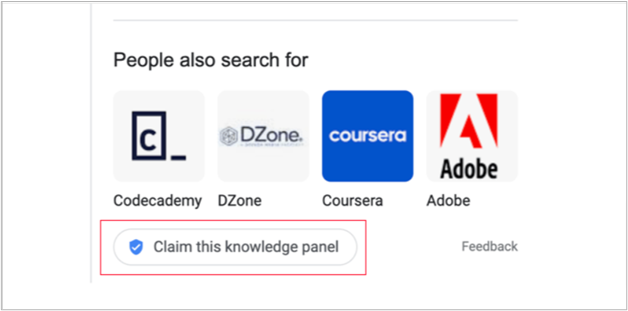
Next, click the “Get Verified” icon at the top of the next page.
This action will take you to the “Get Verified on Google” form, where you can confirm to Google that you own or have the right to the entity in the Knowledge Panel.
Google will ask for proof of ownership. This could include:
- Official Website Verification – If your website is linked in the Knowledge Panel, you may need to verify it via Google Search Console.
- Social Media Authentication – Google may check whether you manage verified profiles (e.g., Twitter, Instagram, YouTube).
- Government-Issued ID (For Personal Panels) – If claiming a personal Knowledge Panel, you might need to upload an official ID to confirm your identity.
Lastly, check the box next to the agreement and click “Submit.”
If you find incorrect or outdated information in your Google Knowledge Panel, you can suggest edits to update the details. Here’s how to do it:
- Search for your name, business, or entity on Google and go to the Knowledge Panel
- Scroll to the bottom of the Knowledge Panel.
- Click the “Feedback” link
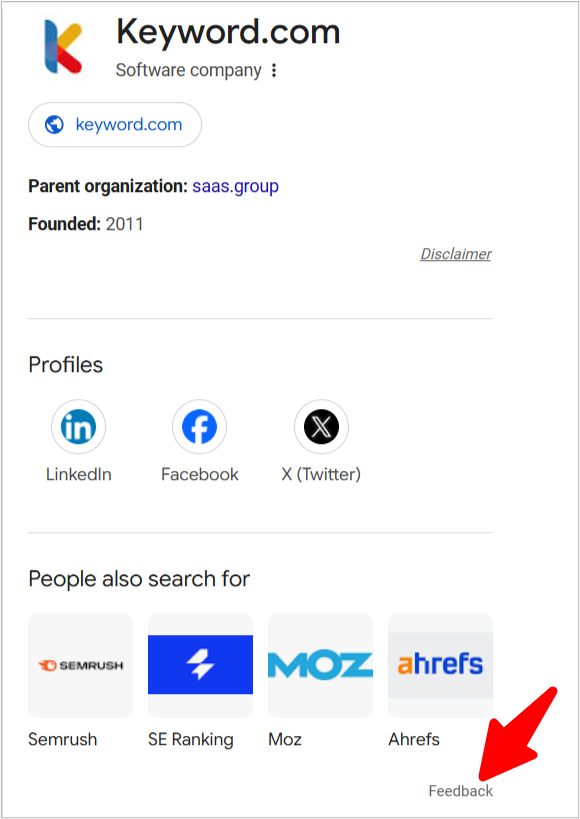
- Once you click “Feedback,” a popup box will appear, allowing you to click the specific section that needs to be corrected. Also, a text box will appear where you can explain the correction.
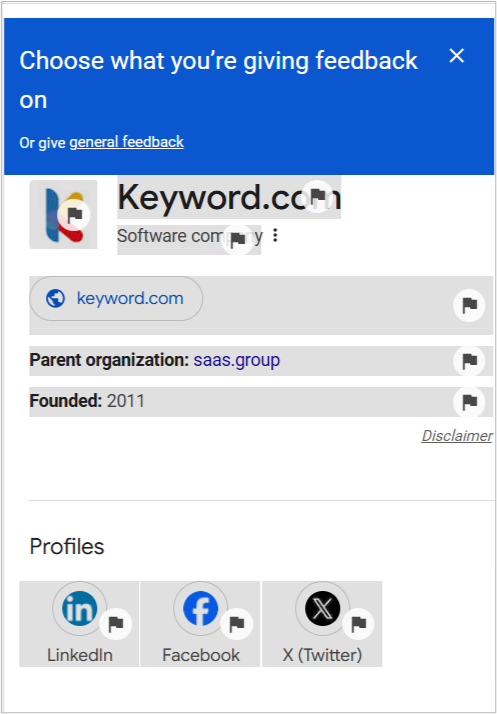
For example, if we click “Parent organization” to change the content, Google automatically lists possible issues.

Click the section you want to correct, fill in the required data, and click “Submit.”
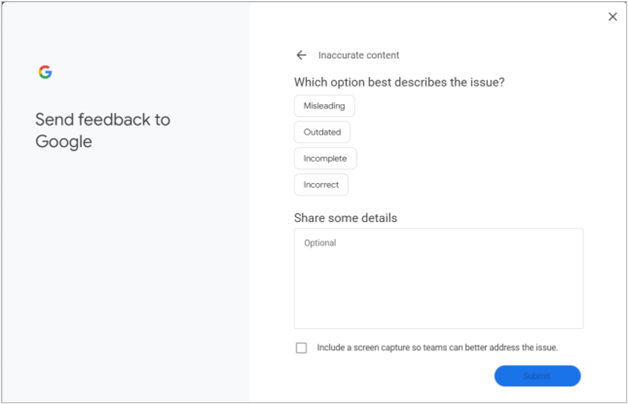
Note: You should provide links to credible sources to support your changes. It may also take a few days to weeks for your changes to be approved.
How a Keyword Tracking Tool Increases Your Chances of Securing a Knowledge Panel
Keyword.com, a keyword tracking software, can monitor your brand name’s ranking in search results and provide suggestions for improving it.
This SERP keyword tracking tool also monitors your keyword rankings compared to your competitors. You can reverse-engineer your competitor strategies and increase your SEO Share of Voice.
Higher rankings equal more authority, which is a crucial signal Google considers when determining who gets a Knowledge Panel.
Are you ready to dominate SERPs? Start your 14-day free trial with no credit card needed to track hundreds of your keywords.
Frequently Asked Questions on Knowledge Panels
1. Why do I have two Knowledge Panels on Google, and how can I address this?
If you have two Knowledge Panels, it might be because:
- Google sees them as separate entities,
- Duplicate or incorrect data sources, or
- One is a personal panel, and the other is for your business.
Here’s how to fix it:
- Claim Both Panels
- Use the “Feedback” button to request merging or corrections.
- Update Information Across the Web.
- Request help through Google’s support page.
2. What are the SEO benefits of Knowledge Panels?
Knowledge Panels increases your search visibility and site’s click-through rate. It also improves your entity recognition and builds a stronger local SEO for businesses.